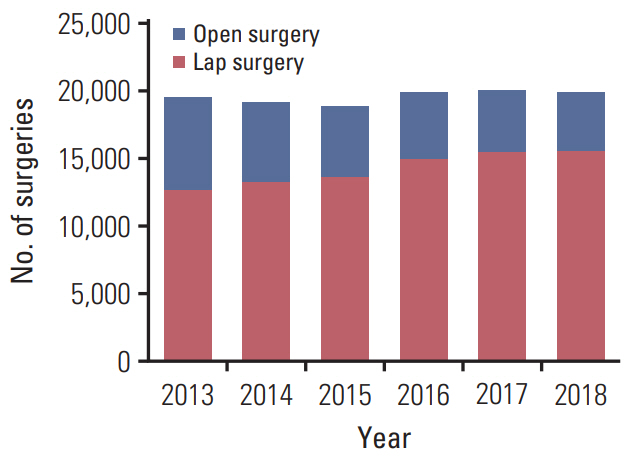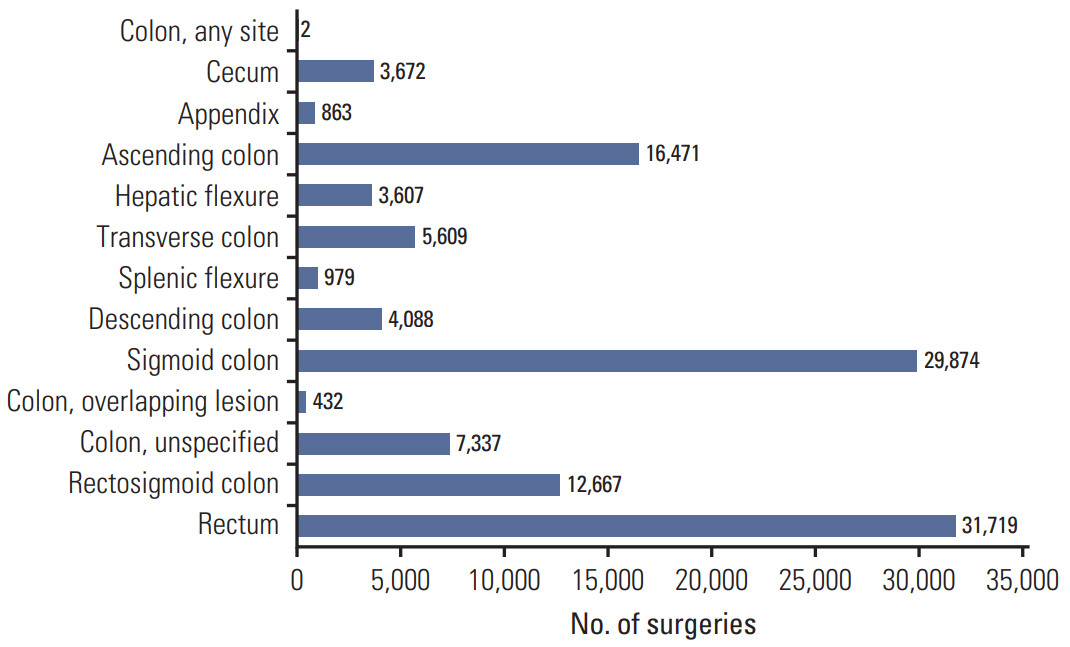Cancer Res Treat.
2020 Jul;52(3):938-944. 10.4143/crt.2020.043.
Laparoscopic Surgery for Colorectal Cancer in Korea: Nationwide Data from 2013 to 2018
- Affiliations
-
- 1Department of Surgery, Kyung Hee University College of Medicine, Seoul, Korea
- KMID: 2504472
- DOI: http://doi.org/10.4143/crt.2020.043
Abstract
- Purpose
We report nationwide data on the current status of laparoscopic surgery for colorectal cancer (CRC) in Korea.
Materials and Methods
Nationwide data of patients who underwent surgery for CRC from 2013 to 2018 were obtained from the Health Insurance Review & Assessment Service database. Data and trends of laparoscopy use for colorectal resection over six years were examined.
Results
In Korea, a total of 117,320 patients underwent surgical resection for CRC from 2013 to 2018. The proportion of laparoscopic resection increased from 64.9% in 2013 to 78.5% in 2018. The rate of laparoscopic resection for colon cancer increased from 64.7% in 2013 to 77.4% in 2018. For rectal cancer, the rate of laparoscopic resection increased from 65.4% to 81.6%. Males accounted for 59.8% of all patients, but females surpassed males at over 80 years of age. The age of peak incidence was in the 60s for males and in the 70s for females. A steady increase in the number of patients undergoing surgery for CRC was observed over 80 years of age.
Conclusion
The laparoscopic penetration rate for CRC in Korea continued to increase annually and reached 78.5% in 2018.
Keyword
Figure
Cited by 1 articles
-
Learning curve for single-port robot-assisted rectal cancer surgery
Moon Suk Choi, Seong Hyeon Yun, Chang Kyu Oh, Jung Kyong Shin, Yoon Ah Park, Jung Wook Huh, Yong Beom Cho, Hee Cheol Kim, Woo Yong Lee
Ann Surg Treat Res. 2022;102(3):159-166. doi: 10.4174/astr.2022.102.3.159.
Reference
-
References
1. Jung KW, Won YJ, Kong HJ, Lee ES. Cancer statistics in Korea: incidence, mortality, survival, and prevalence in 2016. Cancer Res Treat. 2019; 51:417–30.
Article2. Jung KW, Won YJ, Kong HJ, Lee ES. Prediction of cancer incidence and mortality in Korea, 2019. Cancer Res Treat. 2019; 51:431–7.
Article3. Jung KW, Won YJ, Oh CM, Kong HJ, Lee DH, Lee KH, et al. Cancer statistics in Korea: incidence, mortality, survival, and prevalence in 2014. Cancer Res Treat. 2017; 49:292–305.
Article4. Park SJ, Lee KY, Lee SH. Laparoscopic surgery for colorectal cancer in Korea: nationwide data from 2008~2013. J Minim Invasive Surg. 2015; 18:39–43.
Article5. Gilmore B, Adam MA, Rhodin K, Turner MC, Ezekian B, Mantyh CR, et al. Evolution of minimally invasive surgery for rectal cancer: update from the national cancer database. Surg Endosc. 2020; Feb. 28. [Epub]. https://doi.org/10.1007/s00464-020-07393-y.
Article6. Inomata M, Akagi T, Nakajima K. Current status of laparoscopic surgery for colorectal cancer based on the evidence of JCOG0404 trial. Nihon Rinsho. 2016; 74:1903–8.7. Saia M, Buja A, Mantoan D, Agresta F, Baldo V. Colon cancer surgery: a retrospective study based on a large administrative database. Surg Laparosc Endosc Percutan Tech. 2016; 26:e126–31.
Article8. Gietelink L, Wouters MW, Bemelman WA, Dekker JW, Tollenaar RA, Tanis PJ, et al. Reduced 30-day mortality after laparoscopic colorectal cancer surgery: a population based study from the Dutch Surgical Colorectal Audit (DSCA). Ann Surg. 2016; 264:135–40.9. Jung KW, Park S, Kong HJ, Won YJ, Lee JY, Park EC, et al. Cancer statistics in Korea: incidence, mortality, survival, and prevalence in 2008. Cancer Res Treat. 2011; 43:1–11.
Article10. Yun SO, Cho YB, Lee WY, Kim HC, Yun SH, Park YA, et al. Clinical significance of signet-ring-cell colorectal cancer as a prognostic factor. Ann Coloproctol. 2017; 33:232–8.
Article
- Full Text Links
- Actions
-
Cited
- CITED
-
- Close
- Share
- Similar articles
-
- Laparoscopic Surgery for Colorectal Cancer in Korea: Nationwide Data from 2008~2013
- Minimally invasive surgery for colorectal cancer, a look back to look forward: a personal history
- Laparoscopic Surgery for Colorectal Cancer
- Current Status of Laparoscopic Surgery for Colorectal Cancer
- Laparoscopic and robotic surgery for colorectal cancer in Korea: a nationwide health insurance database analysis from 2019 to 2023




